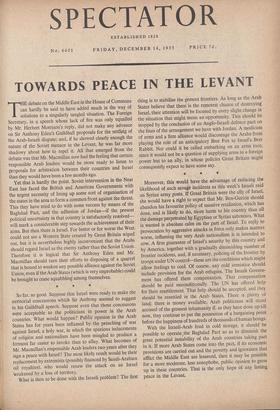TOWARDS PEACE IN THE LEVANT
THE debate on the Middle East in the House of Commons can hardly be said to have added much in the way of solutions to a singularly tangled situation. The Foreign Secretary, in a speech whose lack of fire was only equalled by Mr. Herbert Morrison's reply, did not make any advance on Sir Anthony Eden's Guildhall proposals for the settling of the Arab-Israeli dispute; and, if he showed clearly enough the nature of the Soviet menace in the Levant, he was far more shadowy about how to repel it. All that emerged from the debate was that Mr. Macmillan now had the feeling that certain responsible Arab leaders would be more ready to listen to proposals for arbitration between their countries and Israel than they would have been a few months ago.
Yet that is hardly the point. Soviet intervention in the Near East has faced the British and American Governments with the urgent necessity of lining up some sort of organisation of the states in the area to form a common front against the threat. This they have tried to do with some success by means of the Baghdad Pact, and the adhesion of Jordan—if the present political uncertainty in that country is satisfactorily resolved— will mark a considerable step towards the achievement of their aims. But then there is Israel. For better or for worse the West. could not see a Western State created by Great Britain wiped out, but it is nevertheless highly inconvenient that the Arabs should regard Israel as the enemy rather than the Soviet Union. Therefore it is logical that Sir Anthony Eden and Mr. Macmillan should turn their efforts to disposing of a quarrel that is bound to weaken any possible alliance against the Soviet Union, even if the Arab States (which is very improbable) could be brought to cease squabbling among themselves.
So far. so good. Suppose that Israel were ready to make the territorial concessions which Sir Anthony seemed to suggest in his Guildhall speech. Suppose even that those concessions were acceptable to the politicians in power in the Arab countries. What would happen? Public opinion in the Arab States has for years been inflamed by the preaching of war against Israel, a holy war, in which the spurious inducements of religion and nationalism have been mingled to produce a ferment far easier to invoke than to allay. What becomes of Mr. Macmillan's responsible Arab leaders two years after they sign a peace with Israel? The most likely result would be their replacement by extremists (possibly financed by Saudi-Arabian oil royalties). who would renew the attack on an Israel weakened by a loss of territory.
What is then to be done with the Israeli problem? The first thing is to stabilise the present frontiers. As long as the Arab States believe that there is the remotest chance of destroying Israel, their attention will be focused by every slight change in the situation that might mean an opportunity. This should be stopped by the conclusion of an Anglo-Israeli defence pact on the lines of the arrangement we have with Jordan. A modicum of arms and a firm alliance would discourage the Arabs from playing the role of an anticipatory Brer Fox to Israel's Brer Rabbit. Nor could it be called embarking on an arms race, since it would not be a question of supplying arms to a foreign power but to an ally, in whose policies Great Britain might consequently expect to have some say.
* Moreover, this would have the advantage of reducing the likelihood of such savage incidents as this week's Israeli raid on Syrian army posts. If Great Britain were the ally of Israel. she would have a right to expect that Mr. Ben-Gurion should abandon his favourite policy of massive retaliation, which has done, and is likely to do, more harm to his country than all the damage perpetrated by Egyptian or Syrian saboteurs. What is wanted is absolute calm on the part of Israel. To reply to provocation by aggressive attacks in force only makes matters worse, inflaming the very Arab nationalism it is intended to cow. A firm guarantee of Israel's security by this country and by America, together with a gradually diminishing number of frontier incidents, and, if necessary, policing of the frontier by troops under UN control—these are the conditions which might allow feelings to cool. Of course, any cold armistice should include provision for the Arab refugees. The Israeli Govern- ment has offered them compensation. That compensation should be paid unconditionally. The UN has offered help for their resettlement. That help should be accepted. and they should be resettled in the Arab States. There is plenty of land; there is money available; Arab politicians will stand accused of the grossest inhumanity if, as they have done up till now, they continue to put the possession of a bargaining point before the happiness of hundreds of thousands of human beings.
With the Israeli-Arab feud in cold storage, it should be possible to operate, the Baghdad Pact so as to diminish the great potential instability of the Arab countries taking part in it. If more Arab States come into the pact, if its economic provisions are carried out and the poverty and ignorance that afflict the Middle East are lessened, then it may be possible for a more moderate, less xenophobe, public opinion to grow up in these countries. That is the only hope of any lasting peace in the Levant.


































 Previous page
Previous page